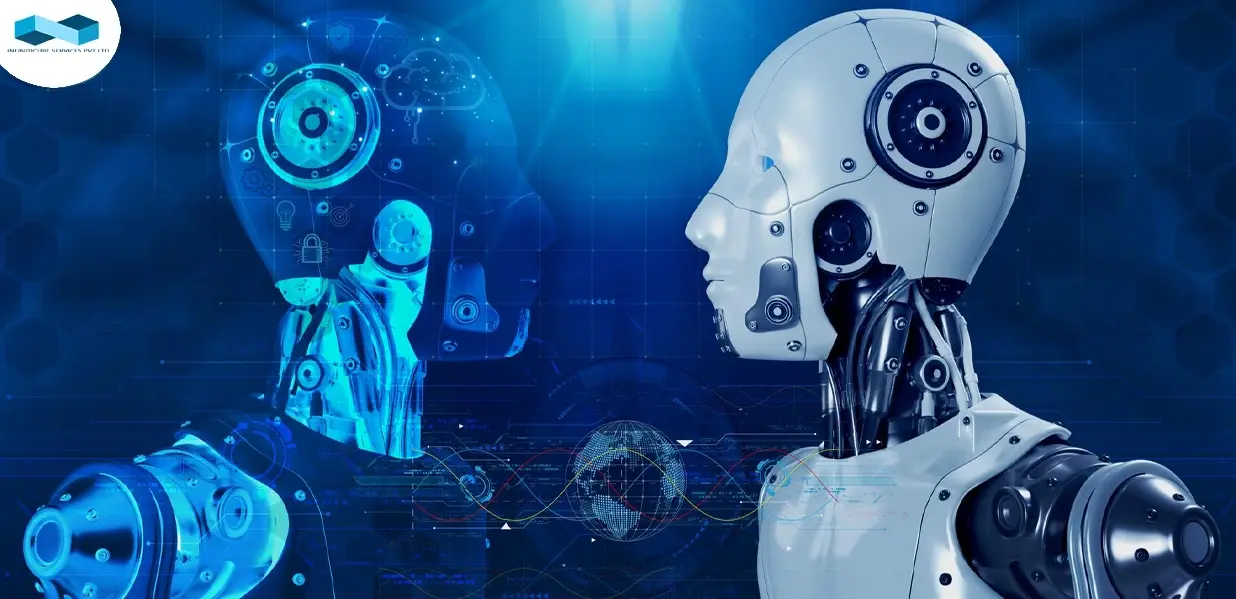The Importance of AI in Business & the Growing Impact of AI
AI in business persists across all facets of our walks of life. From personal lifestyles to major firms, the blast of AI has smashed everything.
We will delve into what all AI has in the offing for organizations and why it is from now on not a luxury but an essential in 2021 and further. Artificial Intelligence has entwined itself into our walks of life somehow that doesn’t even look innovative any longer.
Right from email scrapping and chatbot service to Google’s predictive search and personalized product suggestions, AI is across all spheres of life. That being said, yet there is a lot of chaos that appears around this lingo. Therefore, let’s take off from the beginning.
What is Artificial Intelligence?
In simple terms, artificial intelligence is when machines can learn and decide how to do it just like people do. There are several kinds of artificial intelligence, particularly regarding machine learning, as opposed to being programmed to think. Machines can study, interpret and learn from data and errors similar to our human brains.
AI technology is affecting customer products and has resulted in meaningful improvements in healthcare and physics and transformed businesses as different as manufacturing, finance, and retail.
Because of the enormous volume of data we develop every day and the computing power readily available, artificial intelligence has blown up in the past few years.
We could be further years away from generalized AI , but AI is still a vital element of our world.
Artificial Intelligence Influence on Business
By setting up proper AI technology, your organization may pick up the strength to:
- Preserve time and cash by automating and improving everyday handling and responsibilities
- Enhance productivity and operational efficiencies
- Speed up business choices on the basis of the output from cognitive technologies
- Prevent wrongdoing and human-caused failures, given that we have established proper AI systems
- Use intuition to forecast consumer choices and provide them with a more satisfying, individualized experience
- Mine massive quantities of data to achieve a variety of leads that have quality and expand your market
- Boost income by detecting and expanding business possibilities
- Develop skills by promoting evaluation and providing perceptive guidance and encouragement
As reported in a new Infosys study, the primary motivation for adopting AI in an organization was a rival advantage. Subsequently, the motivation came from:
- An executive-led judgment
- Specific industry, practical or technical problems
- An in-house experiment
- Consumer needs
- An unpredictable result of a complication
- A by-product of another project
With a great deal of buzz around AI, it appears to solve all the challenges. It's an incredible tech that can do all that demands to be pulled off to win market leaders' competitive edge. But how many undeniable perks of AI can you name?
With the range of application areas, it’s practically unthinkable to specify all the benefits. Let’s make an attempt to examine some major advantages that AI creates for the market.
Serving consumers with individualized marketing boosts customer commitment, it also facilitates developing customer loyalty and boosts sales; therefore, businesses are investing a lot of energy into it.
The advantage of using AI is that it can analyze patterns in consumers’ browsing patterns and shopping habits. Using loads of transactions accumulated and interpreted in the cloud, AI can produce exceptionally accurate suggestions to different shoppers.
2. Automating Customer Interactions
Maximum client communications, such as emails, online conversations, social media chats, and telephone communications, currently need human interference.
AI, though, is empowering businesses to automate these conversations. By studying data compiled from past conversations, it is viable to program computers to react precisely to consumers and take care of their queries. Also, when AI is coupled with machine learning, the more the AI platforms communicate, the better they develop.
One such example is the AI Chatbots, unlike humans, can communicate with infinite clients at once and can both react and start the conversation—whether on a website or an app.
Experts estimate intelligent machines that can replicate human functions will take care of 85 percent of all customer interactions. Dialing the call center for troubles is almost ending.
3. Real-time Help
AI is also suitable for organizations that call for regular contact with high volumes of consumers each day. For instance, the transport business, which could get tons of commuters every day, can take advantage of AI to reach out to the customers in real-time, and to send customized journey instructions, for example, news of stoppages.
A few bus businesses are now following the whereabouts of their busses and adopting AI to serve passengers with real-time up-to-date information about where the bus is and its expected arrival time. Consumers get this message on the bus company’s app.
4. Data Mining
The great thing about operating cloud-based AI is that artificial intelligence apps can immediately identify significant breakthroughs during the refining of big data. This can yield companies with previously unexplored observations that can benefit and give them an edge in the marketplace.
5. Operational Automation
AI can run other technologies that enhance automation in industries. AI can guide robots in industries or keep ideal temperatures by smart heating.
In Japan, humanlike machines are now serving as assistants in certain countries’ hotels, automating check-ins, booking services, and managing customer inquiries in multiple languages.
At the retail level, AI is further connected to RFID and cloud technology to follow supply. In China, police units apply AI to arrest lawbreakers. The country has an extensive CCTV network and AI employs facial recognition software to identify and hunt suspects so that they can capture them.
6. Predicting Outcomes
An additional benefit of AI is that it can predict events predicated on data analysis. It examines patterns in buyer data that can reveal whether the commodities immediately on sale are ready for sale and in what figures. AI can also forecast when demand will dwindle.
This can be eminently effective in encouraging the firm to buy the right stock and in the right quantities. Experts predict that, inside 10 years, it will do the days of periodic sellouts as AI will mean there is insufficient residual stock for sale.
The finesse to predict is not just effective in retail. We currently employ AI in lots of other things, for instance, in banking where it can forecast currency and stock value variations, or in healthcare, it can predict epidemics of plagues by studying social media posts.
7. Develop a Hiring Procedure
This may be grave news for hiring businesses, but AI is now serving industries to automate the hiring of fresh employees. It can rapidly scrutinize applications, systematically dismissing those which do not satisfy the company’s particular blueprint.
This not only preserves time but also money spent on a recruitment agency and assures that there is no favoritism or preference in the screening process. AI programs can also manage the various administrative responsibilities of hiring.
8. Preserving Time and Money
For working, machines are more productive than humans. AI machines can work 24/7 without being sick and tired. They also do not have to fall asleep, nor do they demand intervals as humans do.
This implies that they are thoroughly dependable whenever you wish to deal with them. They can alert you about serious matters you want them to do that.
Artificial intelligence machines may as well study large volumes of data in a matter of seconds. They commonly take little time to decide as long as they have proper data.
Hence, this technology is astonishingly a time-saver and functions more productively than people would do.
9. Produce Business Insights to Make Smart Decisions
In the contemporary economy, data is a priceless wealth in any market. If you cannot use it to your advantage, your market data will be meaningless.
AI machines are effective at quick data handling to develop suitable solutions for questions cropping up in the market. They provide perfect predictions and buyers’ desires regarding what they understand.
No individual will be as rapid and yet precise as AI technology in predictive analytics.
10. AI Technology Improves Productivity
When you cut down assignments from your employees’ to-do register, we expect them to zero in on quality in what they do.
With AI technology, you do not have to accumulate a great deal of work for your workers to handle, since AI will do the majority of the work. This gives your personnel to do what they are good at, thus promoting productivity.
If your business requires continual contact with consumers during the day, AI will provide real-time help.
11. Reducing Errors
While artificial intelligence is not flawless, it is considerably more detailed than humans.
Predominantly, the accuracy of AI technology ranges from 99 to 100 percent, even for deeply sophisticated organizations.
For any business, the most tedious method yet sensitive to human-caused failure is cash flow prediction. AI technology can cooperate in strengthening efficiency in projecting cash flow without standard intervention. This allows the organization more possibilities for attaining victory.
12. Improve Forecasting Accuracy
Possibly the most serious business advantage of AI is the decline in individual faults. A time-consuming method subject to human failure but a prerequisite for business prosperity is estimating cash flow.
AI technology can facilitate a business to automate objective forecasting without human interference. This provides businesses further light on their subsequent investments, allowing them to make the best possible decisions and start achieving goals.
13. AI Unlocks Opportunities
Based on the latest McKinsey study, businesses that employ AI will enhance cash flow by above 120% by 2030. It is now apparent that AI will enhance the value of customer service, work to develop additional revenue, and cost reduction. Additional applications for the technology to promote business seems to be unlimited, it is solely limited by human imagination.
Whether you are trying a course in management, design, human resources, or marketing to exploit the innovation that AI will make possible, begin with a sound foundation in business fundamentals.
With a wide variety of courses open across four European campuses and online, there are a considerable number of opportunities to identify the ideal next step in your profession.
The Future of Artificial Intelligence
So, how will artificial intelligence be used in the future? It’s tough to explain how the technology will develop, but many professionals see those “commonsense” jobs growing even simpler for computers to deal with. That implies robots will turn immensely effective in everyday life.
AI is making what we once looked at impossible possible, like driverless cars. Driverless cars are a reality because of access to training data and rapid GPUs, which are both essential catalysts.
To guide driverless cars, an enormous amount of accurate data is expected, and the pace is important to start the training. Five years ago, the processors were too sluggish, but introducing GPUs made it all achievable. Fast processes and heaps of clean data are essential to the progress of AI.
Artificial intelligence is on the point of transforming mundane jobs, such as eating out. Experts predicted a restaurant could use that artificial intelligence, for instance, to choose which music to play according to the interests of the customers in gathering.
Artificial intelligence might as well transform the look of the wallpaper because of what the technology expects the aesthetic choices of the crowd could be.
If that isn’t enough, experts foresee that artificial intelligence will take digital technology out of the two-dimensional setup to which people have become acquainted. Alternatively, the initial user interface will grow into a physical environment encircling a human being.
What we are going to witness in the future with AI and a union of the internet of things is that the display on the mobile screen won’t be the primary interface, instead, the environment is going to be the interface.
What Does Artificial Intelligence Mean for the Employees?
After all these new artificial intelligence use cases, there comes the horrifying challenge of whether machines will make people useless.
Some experts angrily reject that artificial intelligence will automate the huge number of jobs, while other professionals see it as a serious challenge.
The shape of the labor pool is unraveling, but personally, I don’t believe artificial intelligence is taking over jobs. AI enables us to build a knowledge-based economy and take advantage of that to establish more reliable automation for a stronger form of life.
It might be theoretical, but if anyone has to be concerned about artificial intelligence and robots replacing white-collar jobs, namely business analysts, hedge fund supervisors, and lawyers.
The shift toward artificial intelligence-based systems is expected to generate an economy to boost jobs that ease the transformation.
Artificial intelligence will generate more revenue than it damages, but it will not be uniformly shared, notably in the beginning. The adjustments will be subconsciously seen and not apparent.
Artificial intelligence in the company will disintegrate long-term business processes and generate various individual jobs to integrate those business processes. Other professionals are not as certain about where new jobs will originate from once artificial intelligence is universal.
Whether favorable or unfavorable, the future is coming rapidly, and artificial intelligence will surely be a part of this. As this technology evolves, the world will discover unique startups, many trade applications, and buyer uses, as well as the shift of specific jobs and the production of absolutely fresh ones. Besides the internet of things, artificial intelligence can completely transform the economy, but its true influence has yet to be determined.
Advantages of AI and Humans Working Collectively
Research recommends that AI doesn’t always work best alone. AI technology is good at driving and even taking over lower-level, monotonous jobs, but organizations often carry out the finest work improvements when humans and machines come together to join forces.
To maximize this impressive technology, consider AI as a mechanism to enhance rather than substituting human skills.
AI Opportunities for Business
Regardless of your reason for thinking of AI, the ability is there for it to transform the way your organization runs. All you need to start is an unprejudiced approach and a readiness to take advantage of new opportunities anyplace and anytime workable.
Consider AI as a materializing technology. It is developing at a rapid pace and may produce some unanticipated difficulties.
In Conclusion
Artificial Intelligence is essential that you can remodel your organization by deciphering enormous sets of unstructured data. Information centered on this data can bring a revolutionized transformation across all enterprises.
It can also cut down workflows, accelerate tasks, dispose of human mistakes, foretell defects, and do a lot of things for you.
Now think of what it can do for your organization!
Not taking advantage of AI is like operating 2000s business schemes in 2021. You know that will not be carried out!
AI is already revolutionizing our lives; in the future, we can hope for-
- AI to operate more productively. As we will have more data volume to rely on and greater computational skills to deal with it.
- AI may not call for human involvement at all.
- It will handle and take advantage of data in a more purposeful fashion.
- Make work practices even smoother.
- Provide more loaded data security.
- More economical and ingenious AI solutions.
If you are keen on migrating to the cloud and using its numerous advantages, watch out for our cloud hosting solutions.
 June 27, 2025
June 27, 2025
 Balbir Kumar Singh
Balbir Kumar Singh
 0
0
 June 13, 2025
June 13, 2025
 Balbir Kumar Singh
Balbir Kumar Singh
 0
0









Leave a Reply